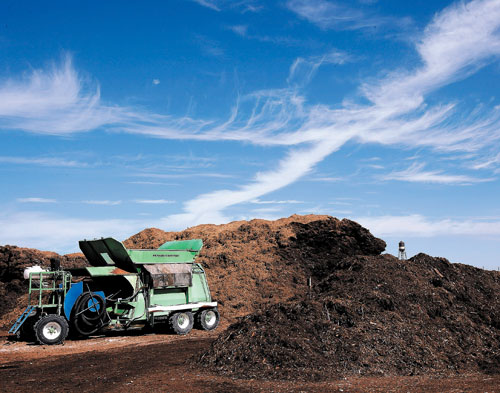Compost riles residents
After buying a $400,000 home in the southwest valley three years ago, Ken Stern began to smell a noxious odor wafting into the neighborhood.
Stern and other residents in the area say the stench emanates from A1 Organics' 10-acre compost site, where yard debris and food waste are mixed into large, rotting heaps that are transformed into soil-enhancing products.
The stink makes it nearly intolerable to be outside or to open a window, Stern said.
"You can't enjoy your life," said Stern, who lives in Cactus Hills Estates, less than a quarter-mile from the compost yard on South Jones Boulevard.
A1 Organics' executives say they have talked to neighbors, listened to their complaints and are working to suppress whatever bad odors the site might emit.
The company doesn't want its eco-friendly mission of diverting waste from the landfill to be done at the expense of residents' quality of life, said Chuck Wilson, president of the Colorado-based company.
"We want to be a good corporate neighbor," Wilson said.
Disgruntled residents will meet with A1 executives at 6:30 p.m. today at the Desert Breeze Community Center. Commissioners Susan Brager and Steve Sisolak plan to attend.
Some county officials say the dispute is a classic case of houses being built in an industrial area where fumes and noises from nearby businesses can intrude on homeowners.
Since May, the county's air quality department has received a couple dozen complaints about odors from the site, and the Southern Nevada Health District has gotten a half-dozen complaints.
Wilson noted that composting has been done there since the mid-1990s, and that A1 Organics began its operation there two years ago.
The company in May began taking dairy waste that probably caused a more putrid smell, Wilson said. Since then, it stopped taking dairy waste, although a foul odor from the remaining waste might linger for a while, he said.
Health district investigators visited the site almost every week since June and have detected only a faint odor outside the gate and a grass-and-wood smell inside the yard, said Dennis Campbell, the district's environmental health manager.
The company ran its operation without a permit for a year before receiving one in 2009, Campbell said.
Campbell said it's possible that neighbors are sniffing odors from other industrial operations in the area.
A1 Organics runs its compost yard within a Las Vegas Paving site that has gravel mining and a concrete batch plant, both of which can emit unpleasant smells, Campbell said.
There's also a portable toilet manufacturer and a fuel depot nearby, Wilson said. "It's a heavy industrial area."
Campbell said there were no houses in this industrial district until several years ago. Real estate agents are required to give homebuyers a disclosure form to sign, confirming they're aware of neighboring industries, Campbell said.
Stern said he received a disclosure document when he bought his house but it only mentioned Las Vegas Paving. It said nothing about a composting site, he said.
Sisolak said he smelled an odor similar to "garbage decaying in your garage in 115-degree heat" when he drove by the site and when he toured it last week.
"If you lived next to it, it wouldn't be nice," Sisolak said.
A1 Organics wants to launch a 40-acre composting site in the Boulder City area, Sisolak said. The company needs to clean up the stench at its 10-acre center before he'll approve a permit for an operation four times this size, he said.
Brager said she drove around the site but didn't smell anything. However, that doesn't mean it doesn't reek at other times, she said.
One solution might be to move the composting to a section of the site that's farther from the houses, Brager said.
The local center employs nine people who help turn the compost into mulch and soil-enriching products, which are then sold to garden centers, landscapers and other vendors, Wilson said.
Last year, the site took in 4,200 cubic yards of food waste, 80,000 cubic yards of construction and yard debris and 340,000 gallons of liquid waste, most of which would've ended up in the landfill, Wilson said.
The waste, he said, emits no toxic fumes.
"There are odors to composting," Wilson said. "Our job is to contain them to the site."
Weather equipment measures heat and wind direction so crews can determine how best to suppress the smell, he said. They spray a deodorizing citrus agent on the compost piles and are applying bacteria that speeds up the decomposition to give the waste less chance to reek, he said.
Also, the compost heaps now sit atop a bluff that is catching the wind more, Wilson said. The refuse soon will be placed inside a quarry pit, sheltering it more from the wind.
Wilson questioned whether any measures would be enough to placate all neighbors.
"We've got some people who are angry and want us out regardless," Wilson said.
Contact reporter Scott Wyland at swyland@review journal.com or 702-455-4519.


















